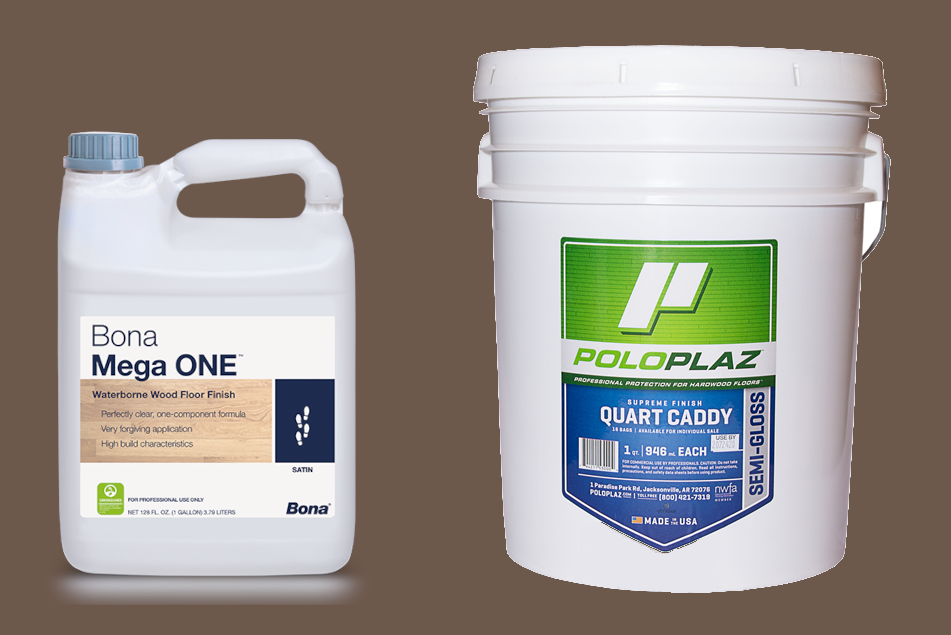Choosing the right finish for your hardwood floors is a critical decision that impacts not only the look of your space but also its durability and long-term maintenance. A finish protects the wood from scratches, spills, and everyday wear while enhancing its natural beauty. The two main options on the market are oil-based and water-based finishes, and each comes with a distinct set of characteristics.
Understanding the differences between them is key to making an informed choice that suits your lifestyle, aesthetic preferences, and budget. This guide will walk you through the pros and cons of both oil-based and water-based finishes, helping you decide which is the perfect match for your Aurora home's hardwood floors.
Oil-Based Finishes: The Traditional Choice
For decades, oil-based polyurethane has been the industry standard for finishing hardwood floors. These finishes consist of polyurethane resin dissolved in petroleum-based solvents. Known for their resilience and rich appearance, they have been a long-time favorite for homeowners seeking a classic, warm look.
Pros of Oil-Based Finishes
- High Durability: Oil-based finishes are known for creating a thick, tough protective layer over the wood. This makes them highly resistant to scratches and scuffs, which is ideal for high-traffic areas, busy households, and homes with pets or children. Typically, only two coats are needed to achieve this robust protection.
- Rich, Warm Appearance: One of the most distinct features of an oil-based finish is the deep, amber hue it imparts on the wood. This can enhance the grain and bring a sense of warmth and richness to the room. The color tends to deepen over time, which many find appealing, especially on darker wood species.
- Cost-Effective: Generally, oil-based polyurethane is less expensive per gallon than its water-based counterpart. Combined with the need for fewer coats, it often presents a more budget-friendly option for homeowners.
Cons of Oil-Based Finishes
- Strong Odor and High VOCs: The biggest drawback of oil-based finishes is the high level of volatile organic compounds (VOCs) they release. This results in a strong, lingering odor that requires significant ventilation during and after application. Homeowners may need to vacate their homes for a few days until the fumes dissipate.
- Slow Drying and Curing Time: Patience is a virtue when working with oil-based finishes. Each coat can take 8 to 12 hours to dry, and the floor needs up to seven days to fully cure. This extended timeline can disrupt home life and delay project completion.
- Yellowing Over Time: The same ambering effect that many appreciate can be a downside for others. Over time, oil-based finishes will continue to yellow, which can significantly alter the appearance of lighter woods like maple or ash, giving them a yellowish tint that may not align with modern design preferences.
Water-Based Finishes: The Modern Alternative
Gaining popularity since the 1980s, water-based finishes were developed as an environmentally friendly alternative to traditional oil-based products. These finishes use water as a solvent for acrylic or polyurethane solids. With advancements in technology, modern water-based options now offer durability that can rival their oil-based competitors, making them an increasingly popular choice.
Pros of Water-Based Finishes
- Clear, Non-Yellowing Finish: Water-based finishes dry clear and remain that way over time. This preserves the natural color and beauty of the wood, making it the perfect choice for light-colored woods or for homeowners who prefer a clean, contemporary aesthetic. It's also ideal for achieving trendy matte or Scandinavian-inspired looks.
- Low Odor and Low VOCs: A major advantage is the significantly lower VOC content, resulting in a minimal odor. This improves indoor air quality and makes the application process much more pleasant. You can often stay in your home while the floors are being finished.
- Fast Drying Time: Water-based finishes dry quickly, typically within 2 to 4 hours per coat. This allows for multiple coats to be applied in a single day, dramatically shortening the project timeline. A full cure is still achieved in about seven days, but the floor is usable for light traffic much sooner.
Cons of Water-Based Finishes
- Higher Cost: Water-based finishes are generally more expensive per gallon. They also require more coats, usually three to five, to build up a protective layer comparable to oil-based finishes. This can increase the total project cost by 15% to 25%.
- Application Can Be Tricky: Because they dry so quickly, water-based finishes require a skilled hand to apply without leaving visible lap marks or streaks. Professional application is highly recommended to ensure a smooth, even finish.
- Thinner Protective Film: While durable, each coat of a water-based finish is thinner than an oil-based one. This can sometimes make deep scratches more noticeable, although modern formulations have greatly improved their scratch resistance.
Key Differences at a Glance
| Feature | Oil-Based Finish | Water-Based Finish |
|---|---|---|
| Appearance | Rich, amber hue; yellows over time | Clear, non-yellowing; preserves natural wood color |
| Durability | High, thick protective layer with 2 coats | High, but requires 3-5 coats to achieve |
| Drying Time | Slow (8-12 hours per coat) | Fast (2-4 hours per coat) |
| VOCs & Odor | High VOCs, strong odor | Low VOCs, minimal odor |
| Cost | Less expensive | More expensive (15-25% higher overall cost) |
| Best For | High-traffic areas, darker woods, traditional look | Lighter woods, maintaining natural color, contemporary look |
Durability and Maintenance
While oil-based finishes have long been considered the tougher option, modern high-quality water-based finishes now offer comparable durability when applied correctly. The key is applying the recommended number of coats.
For maintenance, both types of finishes are relatively easy to care for with regular sweeping and cleaning using a pH-neutral hardwood floor cleaner. Oil-based floors may require less frequent refinishing due to their thicker initial layer, but water-based finishes can be easier to touch up in specific spots if damage occurs.
Making Your Decision with Creative Floors Inc.
Choosing between an oil-based and a water-based finish ultimately comes down to your priorities. Do you value the rich, traditional look and durability of an oil-based finish and can accommodate the longer drying time? Or do you prefer the clear, natural look, faster completion time, and eco-friendly benefits of a water-based finish, even with a higher budget?
At Creative Floors Inc., our team has extensive experience working with both types of finishes in homes across Aurora, IL, and the surrounding Chicago area. We can provide expert guidance tailored to your specific needs, helping you select and apply the perfect finish for beautiful, long-lasting hardwood floors.
Ready to transform your floors? Contact us today for a free estimate and let's discuss the best finishing options for your home.
Frequently Asked Questions About Hardwood Finish
Oil-based finishes create a tough, amber-hued protective layer that enhances wood grain with a warm, rich appearance, while water-based finishes dry clear and maintain the wood's natural color. Oil-based finishes release high VOCs and have strong odors, whereas water-based options have low VOCs and minimal odor, making them more environmentally friendly.
Oil-based finishes are generally less expensive per gallon and require fewer coats, making them more budget-friendly upfront. Water-based finishes cost 15-25% more overall due to higher material costs and the need for additional coats, but they offer faster project completion.
Oil-based finishes take 8-12 hours per coat to dry and up to seven days to fully cure, potentially disrupting your daily routine. Water-based finishes dry in just 2-4 hours per coat, allowing multiple coats in a single day and making floors usable for light traffic much sooner.
Oil-based finishes create an amber hue that deepens and yellows over time, which can significantly alter lighter woods like maple or ash. Water-based finishes dry clear and remain non-yellowing, preserving your wood's original color and making them perfect for contemporary or Scandinavian-inspired looks.
Oil-based finishes complement darker wood species beautifully, enhancing their natural grain with rich, warm tones. Water-based finishes are ideal for lighter woods or when you want to maintain the wood's natural appearance, making them perfect for modern design preferences.
Both finish types are easy to maintain with regular sweeping and cleaning using pH-neutral hardwood floor cleaners. Oil-based floors may require less frequent refinishing due to their thicker protective layer, while water-based finishes can be easier to spot-repair if damage occurs.
Ready to choose the perfect finish for your Aurora home? Contact Creative Floors Inc. for a free estimate and expert guidance tailored to your specific needs. Our experienced team serves Aurora, IL, and the surrounding Chicago area with professional hardwood floor finishing services.

